
ADVENDURE is the leading web portal in Greece about Mountain Running, Adventure, Endurance and other Mountain Sports
info@advendure.com
Just a few days remain for the start of the race that is considered globally as the 'Holy Grail' of all ultra races. Spartathlon revives the glorious footsteps of 'hemorodromus' Pheidippides, who ran from Athens to Sparta just before the battle of Marathon to seek for help, even if now it is difficult to verify the exact historical route followed 2.500 years ago. This fact however does not prevent it from being perhaps the most successful historic event revival worldwide through a sporting effort. This fact, as well as its brutality as an ultra race, has declared it to be particularly popular among ultra athletes from around the world and of course from our country.
This year the race has implemented changes that are crucial, such as the number of participants, which has increased to 380 - by far a higher number compared to the 315 participants last year. Among these, there are 52 Greek athletes, also the higher number that will take part in the race. A particularly important change is that this year another point is added where athletes can receive help from their support groups. It is located at the kilometer point of the marathon (approximately 42.2 km to Megara). Additionally, 2 more electronic timing mats will be added, reaching 10 in total. And that further defines the specificity of the race considering that each checkpoint starting from KM-75 is also a cut-off point. Proof of recognition of the significance of the race is that Spartathlon is being held this year under the auspices of the Greek Ministry of Tourism. The start of the race will be on Friday, September 26 at 07.00 in the morning, just below the Acropolis, which further intensifies the evocative spectacle of athletes from many countries who are preparing to give a great fight on the way to the statue of Leonidas in Sparta.
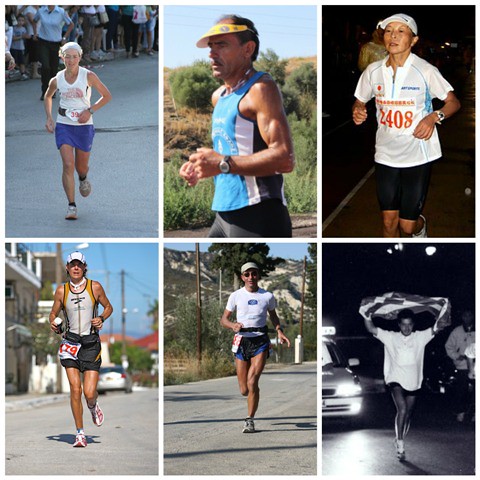
In these 32 years where Spartathlon is held, 2,171 athletes have managed to finish within 36 hours, which is the limit of a valid finish. If the athlete is able to finish under 29 hours, will be part of approximately 10% of the fastest finishes. 27 hours is the limit that has not been broken by female athletes, however the famous Lizzie Hawker was very close to break it in 2012 with 27.02.17 (best performance of all times by a female athlete). Under 27 hours, the male athletes begin "seeing" the podium. If someone finishes under 24 hours, certainly belongs to 1% of best time finishes. The 23 hours limits has been broken only by Scott Jurek, Ivan Cudin and Yiannis Kouros. Under the limit of 22 hours there is only one name. Yiannis Kouros to whom belong the four best performances of all time in Spartathlon. 20.25 1984 (average pace 4: 55min / km), 20.29 in 1990, 21.53 in 1983 and 21.57 in 1986. Kouros approached the incredible limit of 20 hours like no one else. Will the 20 hours limit be broken sometime? Perhaps an equivalent question on whether any runner will be able to break the 2 hours mark in Marathon!

In the videos below we can follow a journey through history, starting with the first official event of Spartathlon back in 1983, when the great Yiannis Kouros began the incredible feat of four monumental appearances with the unimaginable record in the race, and leading to both last year's winners, the Portuguese Joao Oliveira and Hungarian Szilvia Lubics:
1983: First Spartathlon and Yiannis Kouros wakes up Sparta with an incredible 21:53!
2013: We all remember the Portuguese Joao Oliveira on his road to an excellent victory with 23:29:08
2013: A Wonderful video that shows the road of Hungarian Szilvia Lubics' towards her win with 28:03:04!
In recent years, many great athletes have written a great story at Spartathlon. Let us remember the winners, but also the first Greek man/women, in the last five years:
| Year | Men | Women | Greek male | Greek female |
|---|---|---|---|---|
| 2009 | Sekiya Ryoichi - 23.48.00 | Inagaki Sumie - 27.40.00 |
Δημήτρης Πετρολιάγκης - |
|
| 2010 | Ivan Cudin - 23.03.00 | Emily Gelder - 30.17.00 | Στέργιος Αναστασιάδης - 29.03.00 | |
| 2011 | Ivan Cudin - 22.57.40 | Szilvia Lubics - 29.07.45 | Γιώργος Κουτσιούκος - 29.07.13 | Αμαλία Ματθαίου - 33.34.04 |
| 2012 | Thoms Stu - 26.28.19 | Lizzie Hawker - 27.02.17 | Στέργιος Αναστασιάδης - 29.46.05 | |
| 2013 | Joao Oliveira - 23.29.08 | Szilvia Lubics - 28.03.04 | Στέργιος Αναστασιάδης - 27.44.10 | Στέλλα Μαρκάκου - 34.34.19 |
Many great athletes that have made history in Spartathlon are returning this year and will give their battle in the front of the pack. The evergreen "doctor" Austrian Marcus Thallman, last year's winner Joao Oliveira and last year's winner Hungarian Szilvia Lubics, the young German Florian Reus who last year impressed us with his performance despite his young age, the also German Thoms Stu, last two years on podium, the great Italian Ivan Cudin who has written his own history in the race and gave us last year along with Thomas Stu a touching common finish, the ever constant and mighty Brazilian Valmir Nunes, and the last year's first Greek athlete Stergios Anastasiadis who showed promises with his excellent performance and positioning at the top ten final overall ranking. Of course there are runners like Marios Fournaris, George Krystallis, Apollonios Gogos, Giorgos Koutsiukos, whose number of participations and finishes are really great and unique.
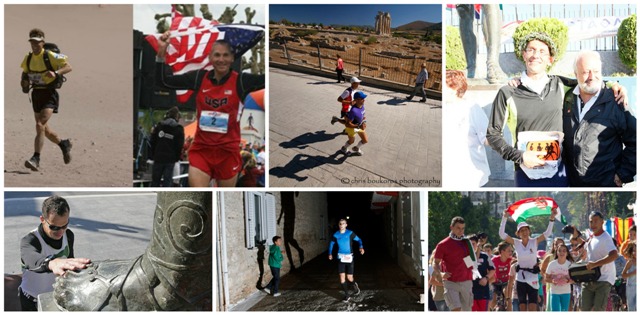
Two great names of the ultra worldwide community will participate in Spartathlon 2014. Jon Olsen is a very important runner, and his greatest achievement is his IAU world championship in the 24 hours race in 2013. He was nominated for the "Ultrarunner of the Year 2013" award by the prestigious Ultrarunning.com, while in the same year broke the barrier of 12 hours at 100 miles. The second very important new participation in Spartathlon is the Greek-American Dean Carnazes of The North Face, whose interview is hosted recently on Advendure. Carnazes has written his own history on ultra running, and he will run this year's race basing his feeding solely on foods that Pheidippides had access at that time, as he said in the interview. He will revive Pheidippides experience due to his upcoming book, which is a historical account of the Battle of Marathon and the glorious "Nenikikamen (We Won)" Pheidippides famous quote.
A special feature of this years' race is the participation of four Greek women athletes, Amalia Matthaiou, Stella Markakou, Sophia Kassimis and Angie Terzi whose "Road to Spartathlon" series of articles is hosted on Advendure.
This year Advendure is the official Web Communication Sponsor of Spartathlon. Our presence will be even stronger than the last two years where we covered the race live. We will host a live webcast using the CoveritLive platform and give great emphasis on the photographic depiction of the struggle of athletes, along with the verbal (via twitter) transmission of their effort. There will be two teams in the field. One team will cover the whole race, till the finish of the last athlete. It consists of Takis Tsogkarakis, Timos Daskalopoulos and photographer Chris Boukoros whose excellent work we all remember from last year's broadcast. The second group has undertaken the role to support (support group) and simultaneously broadcast the effort of Dean Carnazes. It consists of Dimitris Troupis, Nikos Kalofyris (athlete of The North Face, like Dean Carnazes) and the very experienced sports photographer Babis Giritziotis of GoExperience, photos of whom we have enjoyed from the largest mountain races in our country.
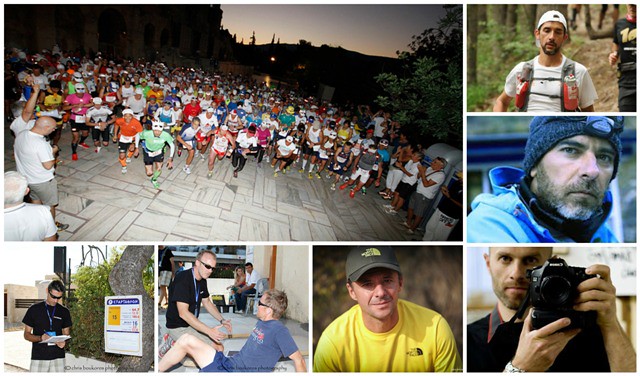
With these teams on the field we will try to give you the best possible picture of the effort of all athletes until the finish of the heroic last one in Sparta, but also that of Dean Carnazes, which will be combined with the excellent, as demonstrated last year, live results' broadcasting of the organization of Spartathlon so as to have a more complete and immediate picture of the race. Besides, let's not forget that apart from the protagonists of the race, the athletes who race in Spartathlon claiming that magic moment that will fulfill their dream reaching the foot of Leonidas in Sparta, deserve such a difficult and coordinated effort.
We want to thank the Spartathlon organization for accepting Advendure as the official web communication sponsor of the race, but also for their significant support in our effort to provide a live web-based coverage. We also owe the live coverage to the kind sponsorship of Coffee Island, and Medicore Hellas, which both supported with great enthusiasm our effort for covering live such a historical race as Spartathlon. We also want to thank The North Face for trusting us to become the support group of their athlete – Dean Carnazes – in his first attempt to run Spartathlon. We want to express to all our gratitude for their significant help! Stay tuned to Advendure live coverage starting Friday September 26th, at 07.00 in the morning!
You can see the list of entries for the 2014 Spartathlon here. We came into contact with some athletes who either are expected to be in the front of the race, or have written history in the race, or their presence is of particular interest and asked them to describe their "Road to Spartathlon"; their preparation, their aspirations of this year's race and a idea of the strategy to follow, and their opinion on the Spartathlon as historic and timeless ultra race. Let's see what they said:
Marios Fournaris:
I first met Spartathlon in 1986 and my love for it was fulminant. For three years I attended as support to athletes and in 1989 I ran for the first time at the age of 22. Since then, I have run in all competitions, except for 2011 and 2012 and I have finished the race 13 times. This year I will participate in Spartathlon for the 24th time.
For me Spartathlon is the most beautiful, magical and magnificent thing I have met in my life. It joins sacred archaeological sites with the historicity of its route. Spartathlon is the best exemplar of pure amateur sport. Runners who participate are not fighting for profit or glory. The pay out of their pockets the full cost of preparation and their participation and involvement in the race is usually known to a small circle of friends. The beautiful originality of Spartathlon is that runners are not fighting to win others, but themselves. It has repeatedly occured, even the first three of the general classification, -while they can finish faster alone- tochoose to arrive at Leonidas along with other runners, helping each other.
So what motivates runners from all over the world (this year, 380 runners from 45 countries are going to start the race), to come every year and suffer in pain and exhaustion en route to Sparta?

Spartathon, which follows Iera Odos (Holy Road) to Elefsina in the end of September is the best revival of the Eleusinian Mysteries. Within 36 hours of continuous running, runners pass the clearance and self-humiliation, the communion of termination. The last 15 kms of Spartathlon is the closest experience to the feeling of flying. The body is aching but also travels with the mind to the entrance of Sparta where everything is golden and gorgeous. The movements of the body are being transformed to dance harmony and time slows down. Musics springing everywhere, Spartans on balconies. The meeting with Leonidas as a sacrifice to his sacrifice is a unique moment, which I can not describe it with words, but it certainly changed the life of the venerable Spartathletes who are fortunate enough to experience it.
The Spartathlon as a living organism unites in harmony runners, supporters, volunteers and organizers, offering unique emotions that accompany them for months, until the next start ...
Tilt by fatigue
and sleepy
Dirty and salty with
bloody blisters
dirt and hair
Without taste with stomach pains
and feet
and dizziness
May we meet you
This year Leonidas
Green with happiness
Stergios Anastasiadis:
So here we are,only a few days before this year's Spartathlon, my main target of the year. For me it is the end of the year, the closing and the beginning of a new one.
What can I say about this year's effort. The preparation had so many obstacles as any other of the previous seven. Obstacles originally associated with both professional and family responsibilities, and personal matters, which prevented me from devoting myself to my goal. When my mind is somewhere else I can not even perform well on a single continuous run, let alone on demanding interval training sessions required by the specific preparation. Luckily for me, things lately have stabilized and was able to deal seriously with my goal. So will I be once again at the start of the race along with many good friends.
My goals for this year, like every year, moreover, are many and different. I always set many goals, starting with the most difficult to just finishing the race, because I think that you should always have something to chase when things get too difficult. Personally if I do not have a specific target is a meaningless effort. More generally on ultra distances goals must be specific, if you lose the primary you should be able to continue to the next so as to be motivated throughout the race. In the end, just finishing the race is always a great goal, because it is by all means a winning performance for each athlete.
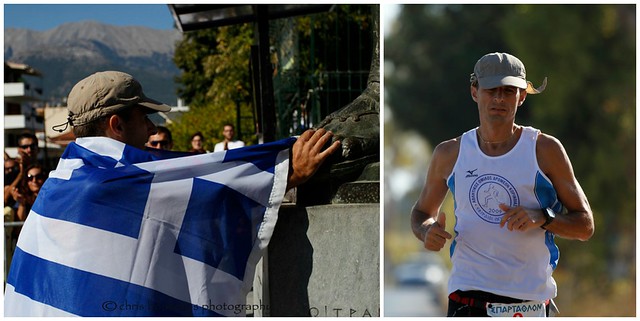
This year, the way I am thinking to accomplish these goals will be different. Nowhere is mentioned who passed first on the first or the second marathon. What matters is the finishing position of the statue of Leonidas. We're talking about a race that at your best lasts about 24 hours. Proper strategic and keeping energy is therefore the approach both by me and by my coach, Yiannis Dagkoglou. Besides, what counts is finally the ability of the athlete to continuously move at an average speed. This seems easy early in the race, but when mileage is added, it seems almost impossible.
With these thoughts, I will try this year to get to Sparta, giving all my best. I want to thank God for giving me strength and my family, whose without their support I would not have accomplished anything. Also I want to give many thanks to my coach from Patras, Yiannis Dagkoglou who has given me the foundation for proper preparation. Finally, I thank my friend Filippos Predaris of Medicore Hellas who actively support me and Giorgos Vavritsas of Performance Store who has undertaken my nutritional needs. Without their help my participation would be difficult if not impossible.
We should be proud to have the opportunity to run in such a race within our country, which brings together some of the biggest names of the ultra distance community. Greek runners are a constantly rising trend since more and more race are being held each year in Greece. Through them the opportunity for everyone to count their forces to confront before Spartathlon. And so it should. As ultra runners should welcome every new race that will make us better. Moreover mileage is inexorably and body acts the same way whether it is in one route or anther. But be careful, trying to find ourselves at the start of Spartathlon should not turn into some way of fashion. One requires several years of preparation and finishing a lot of great races so as to be able to finish the race healthy and stay in ultra distance racing for many years.
I wish all my fellow runners, but especially the Greeks, to touch the foot of King Leonidas. Leave aside the everyday problems and having companionship their positive thoughts to successfully complete this journey.
Giorgos Panos:
This year for me is the fifth consecutive year in which I will participate in Spartathlon. I race in ultra distances since 2006 and in in 2007 was the first time I acquired the qualifying criteria for Spartathlon. Consciously thought, my first participation was when I felt my body ready for this test and I ran for the first time in 2010, since then every time I'm there. I have under my belt three finishes under the statue of Leonidas and an abandonment of the race in 2011.
In Spartathlon, except from the route where you never know what you'll meet, you have to be prepared for everything. In 2010, athletes were running all night under heavy rain on dirt roads, the water swayed stones, while another example in 2012 again in Spartathlon, there was a terrible heat wave that as a result of the 300 participants proportionately the finish of only one in five athletes. Nevertheless usually finisg only one in two or one in three participants.
Finishing such a hard race does not have only to do with how you prepare for it but it is a combination of physical preparation and mental strength maybe More of mental strength. He who finishes well before reaching the statue of Leonidas has "quit" so many times.
From deep inside when the hard times come one has acquired the strength needed to continue and only thyself knows where he "hooked" from with his mind and in what way he enlisted the remaining mental reserves to overcome the pain, the fatigue, the limits of physical endurance. Training alone is not enough while "soul" without training bases do not lead you to the statue.
The power to endure all these is being derived by my family. My wife with our daughter (now almost 5 years old) and my mother at the finish line when I leave my body jaded in their hands, I know that they it is protected in the strongest hands I've ever met. My daughter in my first Spartathlon was just nine months old, and I was eager to get her arms to touch the statue of King Leonidas in fact at my first finish, while in the latter I promised her that we 'd climbed up the statue to touch Leonidas' sword and so we did. While, several hours earlier in the same race I was on the verge of leaving. The physical presence of my family in Spartathlon primarily as "Idea" for my effort, is therefore necessary.
I traing without a coach. My physical preparation includes what is considered basic for such distances, long runs and interval training adjusted to my own level and needs. I also pay a great attention to my nutrition throughout my training for the race and of course rest. My "belief" is that if you wand to be better at something it's not enough to stregthen your already "strong" points but to work on your weaknesses.
The reason for my DNF on 2011's race was that I was unable to stay awake through the night, to the extent to stumble and have hallucinations. I always had this sleep issue in races with duration of over 24 hours. So for next year that I would run again in Spartathlon, I was often going out for running some hours after midnight. I think the adjustment of the body during the workout to what might be encountered in the race, it helps a lot.
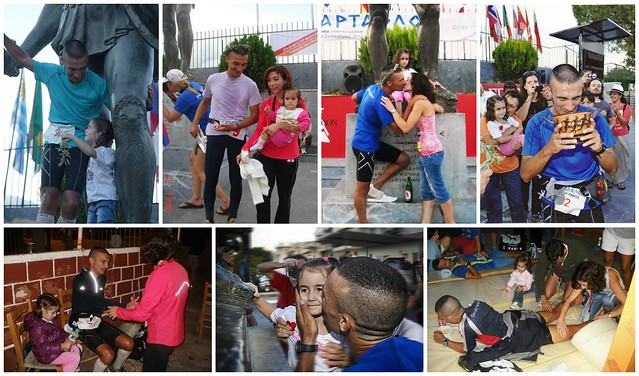
Reading is something I really enjoy, especially in the time I build my psychology for the race, I read my favorite books or excerpts from them, which help me in this matter. Psychology in turn plays a big role in the outcome of the effort. These I am being shielded psychologically for this year's Spartathlon.
I work as a nurse in the intensive care unit of the Attiko Hospital. By itself it is a demanding work, prolonged standing is granted and physical fatigue at the end of the shift often indescribable. This combined with the time shift, forcing me not to have steady and the training has to be done in hours between work and family and other obligations, morning or afternoon or not at all if I out of energy after a hard shift. This instability in my schedule is also one reason why I run without a coach because I am unable follow a strict training schedule. But I'm lucky because I work in a positive and collegial atmosphere and until now I have not met any obstacle regarding the needed vacation days for competitions, for participation or recover from them. Contrary in their way many of my colleagues support my efforts.
I also belong to the category of athletes who run without ecomical or by any other means sponsored support. This makes it even more difficult if one thinks about the cost of preparation and equipment for such races. Especially nowadays, even more, if you have to support a family. So, part of our family budget is spent for my preparation and equipment, sometimes at the urging of my wife Maria (I feel so lucky) and after my insistence not to buy new shoes for example.
Spartathlon is by itself a challenge for every utlra distance runner. Besides its sport spirit though, the race is being lived by the runners as an esoteric procedure and "pursuit" and this is the reason that more and more athletes come to race. Of course there are also some "bubbles" where at sometimes they appear but sooner or later like all the bubbles...they explode.
The tremendous rise in the numbers of Greek runners that participate last years in Spartathlon and of course the number of finishers that year by year is growing, is a good message to everyone, especially when more and more Greek women try it, a message that the running quality of our country has uprisen.
Finally, I wish to all of us a good race. I want to thank toy for the support to all athletes, the updating and the live coverage of the race through your website both with text and pictures, giving the opportunity to our friends to live the experience from their home. I 'll be more than glad to meet you on our long way to Sparta...
Angie Terzi:
My preparation for Spartathlon started last year just after finishing the Olympus Mythical Trail ultra-trail race. While I had intentions of running the Rodopi Advendurun 100 miler the following autumn, I was rightly advised by George Psailas that for Spartathlon I should go back to asphalt at least a year earlier. And of course he was totally right. Endless miles and hours on tarmac acclimatized me quickly and soon became my friend again.
The preparation went well, without many injuries and psychological changes. The biggest difficulty I had was the irregular hours of my job, the erratic shifts and therefore erratic hours of workouts. But with the right organization and encouragement from my close environment these reefs were just small daily obstacles I learned to quickly overtake.
My goal for 2014 ... to finish Spartathlon in a decent state, which is upright and smiling! It would be impertinent to put a time goal in my mind as a "rookie" this year. So my strategy for the race mainly is an early arrival at cut-off check points. The initial aim is to get to Corinth in time which means to get in good shape so I do not have to get "burnt" to accomplish this. Then ... wait and see. Having seen the route of the race last year, I do not forget that as in every race, things look different when inside than if you are outside. So I will try to run smart and user the training I have put on my legs and my mind, but mostly ... I think this is the philosophy that generally the ultra distance requires.

The runner that is being prepared for such a daring and big thing is alone in training. Though, in the background, there are always some people whom without them everything would be more difficult. Without Vicky Karpouza and her support, surely my long runs would not be the same. With the coaching guidance of Dimitris Kassimis I would not run "clever miles". Without Advendure that hosted my articles of "Road to Spartathlon" I would not be motivated to.
There are also companies which supported me on the running equipment part of my preparation and to whom I want to refer more extensively in an article soon. Summarizing these are Inov-8 and Kostas Lamprou, Compressport and HOKA with Leonardos Goulandris, Giorgos Theodorakopoulos of "Vrazilianos Coffee", brothers Kagiopoulos with Solo Bars, Giorgos Vavritsas of "Performance Store", Grigoris Papanaikolaou of "X-treme Stores" in Kozani. In the end, my friends Giota Katsanou and Kostas Kourtelis will cover the cost of my support team. As I said, without all of them in the background, my training alone would not get me to the starting line.
Finally, I wish to the organisation all the best for 2014, strength to all the runners and "bon courage" to their support teams! I wish you guys at Advendure all the best on your live coverage of the race for the third consecutive year.
Ivan Cudin:
I feel Spartathlon like the biggest emotional trip I have ever done. I feel like I left a piece of my heart on the road to Sparta and I must be back to find it, but each time I'm back a biggest part remains lost there.
I love running with boys running and riding around me, going across lands and ancient cities full of history, passing through villages where people show their never-ending hospitality, loosing my body in wonderful landscapes, meeting friends waiting for me in Sparta, sharing joys and pains with all the runners, thinking to my family and my friends suffering from home more than me waiting for a monitor refresh, helped by extraordinary volunteers awake all the night long with their smiles.

I definitely like running and running the Spartathlon is the top for every ultra-runner. My psychological condition is good, the physical condition is not great. I trained not as much as I would, because I was very busy at work. I just want to enjoy my Spartathlon. I do not fight with anyone during the race, I just want to try to reach Sparta on my legs, that's the biggest satisfaction for me.
Florian Reus
This year, my goal is to finish the Spartathlon in 24 hours and 20 minutes, as this is this the fastest time that has ever been run by a German Spartathlete. Since the World Championships in 24 hour-running were canceled this year, I have completely focused my training on the Spartathlon. This also means that I haven’t participated in a single long race since last year’s Spartathlon. However, I tried to improve on shorter distances in the first half of this year to increase my potential for this year’s race. I think that I have prepared myself extremely well and I’m really looking forward to starting the race next Friday. Then we will see if it has been worth to run over 5,000 kilometers in 9 months’ training. Maybe I can improve myself compared to last year and finish first!

João de Oliveira
My name is Joao de Oliveira, I am Portuguese, and I live in the city of Chaves, known as Flaviense People. I always liked big challenges and a runner friend of mine suggested me to visit Athens and try a fabulous race that stands for something that is not achievable by any athlete. It is a dream for every ultra runner to finish this race. I am participating in Spartathlon since 2009 and always my starting aim was to finish the race

In 2010, I managed to finish in 4th position overall. Since that day, my main goal was to win the Spartathlon. Which came true in 2013! My goal for 2014 is to lower my personal record, the 23.29.08 of last year’s winning time. My training was like last year with a few differences such as the temperature and geographical conditions. This year will the 6th time I will run on Spartathlon and if one thing is true is that every time you run Spartathlon, it is different!
The organization year by year is getting better, improving in a lot of areas, and it welcomes, assists and solves whichever problems arouses. The Spartathlon is undoubtedly the QUEEN of all ultramarathons. For the beauty of the landscapes, the people, the food, the affection in which we receive everywhere we go through and the crowds of people who expect us on the finish line.
Thank you Spartathlon!
Karl Hubert:
Ideas about Spartathlon
It was in 1983 when I watched by accident a short report on the first Spartathlon on TV. At that time I had just started running and planned my first marathon which I finished in 1984. I never lost the Spartathlon report out of my mind and have always thought about the possibility of once participating in that race. In 1989 the Swiss Alpine Marathon was my first ultra distance race and in 1992 I made my dream come true and started in Athens to finish the Spartathlon. I was so deeply impressed by the entire atmosphere and in particular the warmth and cordiality of the audience, that there was no doubt at all, that it could not have been my last participation at Spartathlon.
In the meantime I’ve – amongst numerous other competitions - also run 6 times the Sakura Michi – a 250 km run in Japan – and the Badwater run – a 216 km competition in the USA. For myself I’ve come to the conclusion that Spartathlon is the toughest non-stop competition in the world and that I shall keep on accepting this challenge as long as somehow possible.
My running philosophy
Physical exercise has always been an important factor in my life, from childhood and youth when I used to play soccer and also as adult when I ran to keep in good shape (not only for playing soccer). And after several years of playing soccer and running I finally decided at the age of 33 years to exclusively concentrate on running.
I’ve always considered it extremely important to plan my personal training reasonably and well-balanced and to always allow my body resting and recreation periods after tough competitions. The absolute majority of the approximately 150.000 km I ran so far in my life were absolved in a rather comfortable speed which in the end lead to a running career with almost no injuries at all.
My motto has always been to generate optimum performance on the basis of a healthy mind in a healthy body. I’m constantly paying extreme attention to the signals of my body, my nutrition consists of a well-balanced whole-food diet comprising everything offered by nature. I’m abstaining from food supplements and I’m paying utmost attention not only to the acid-base balance but also to a well-functioning immune system.
Overall I can state that I have been experiencing the positive aspects of running at my own body for the past 30 years of my life.
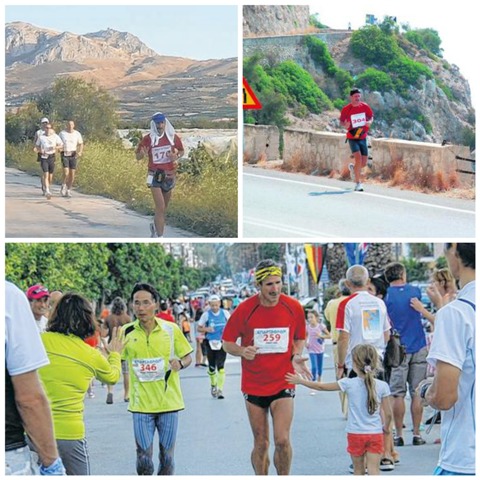
My preparation
Getting older implies a constantly more intense training becoming essential for somehow maintaining the running performance level. During the past five years my professional career has unfortunately prevented me from preparing for Spartathlon in an optimal way.
In the first half of 2014 time for training was extremely limited, so the month of August was the one with the maximum of training kilometres, on 130 to 150 kilometres per week. Since finishing Spartathlon last year, the only ultra-distance race I participated in were the 100 km of Biel in Switzerland. The longest training distances in August were 60 and/or 80 km runs. As a result of the evident lack of endurance training I’ll have to concentrate on mental training enabling me to compensate for physical fitness.
Goals for the upcoming race
Arrive within the time limit and touch the foot of King Leonidas for the 18 time.
My message
Running experience gathered since 1983 with more than 150.000 absolved kilometres has lead me to the conclusion as to how important it is to integrate running into daily life thus benefiting from running’s long-term impacts. During now almost 20 years working as a trainer with running children I’ve been amazed to see their joy and enthusiasm for physical exercise and I’m absolutely sure that this will dramatically increase their prospects for countervailing lifestyle diseases in the future.
A vast majority of all people have been gifted with a healthy body and it should be our duty to appreciate, preserve and maintain this present. It should be essential for everyone not only for himself, but also for his fellow human beings and his environment to accept responsibility for his body, to maintain and take care of it in the best possible way in order to preserve invaluable assets such as mobility, vitality and healthiness for as long as possible.
In this context running has been playing an important role, as all of us are at least to some extent “Pheidippides”. From the genetical point of view we are still in the stone age and as 10.000 years ago our bodies have been made for running.
Now I’m definitely looking forward to Greece, to Spartathlon, to the many participants from all over the world (many of which have become good friends during all those years), to the cultural exchange, to the nice people from the Spartathlon organization who have always been supporting us with so much enthusiasm and I wish everyone the incredible sensation of finally touching the foot of King Leonidas.
Jon Olsen
Well, I want to first say that me running this race is a dream come true. Because if I am traveling to Greece and running Spartathlon....that means my running is in a very good place. A place I never thought I would get to. But through God's grace and strength I am here. Spartathlon is the one race I want to run before I finish my "competitive" running career. I just don't want to show up and run....I want to race and compete at a high level.
Unfortunately, my foot hasn't allowed me to train ideally BUT it won't be an excuse on race day. I will give everything I have. I am a middle school teacher so I had the summer to focus on family and running. I got all the training in I could even with the foot pain. That included two marathons as speed work.(SF Marathon 2:35 and Santa Rosa Marathon 2:32 four weeks apart) I am pleased with my speed. I just don't know how my heel will feel after 50 plus miles. I had to taper further out than I wanted because of my heel but I'm hoping the rest did my body some good like it did at Worlds last Spring when I had to taper early then because of injury.
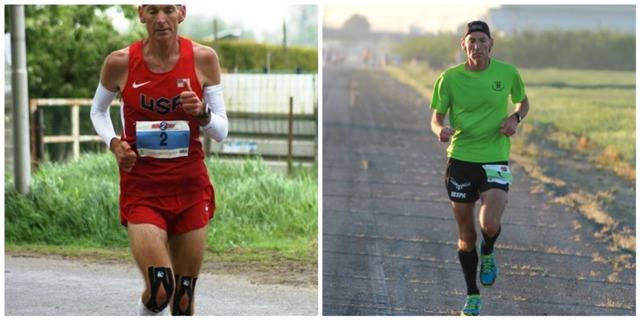
I'm hoping to build on my 24 Hour World Championship performance from last spring and my 100 mile performance on track last fall (11:59:32 AR at the time) and I'm looking forward to the challenge. I brought along a one person crew with me and have an enthusiastic driver we secured here in Greece, so I feel like I have all the tools and things in place to be successful. I'm curious to see how things turn out. In the end, I want to honor my country, family, city(Modesto, and myself with a hard fought performance.
Piort Kurylo
Spartathlon is a race of “Truth”. What I mean is that this race is testing the athlete from every possible aspect: physically, emotionally, spiritually and under all possible conditions: day, night, heat, cold and vertical ascend.
My goal is to finish first. I’ve already finished second in the past so there is no other goal anymore.
I’ve started my preparation for the race 10 months ago, which has culminated with my travel from Poland. I feel very strong. I had a muscle pull under my knee during my passage from the Bulgarian mountains, but it is far better now and I believe that I will be 100% ready at the race day.
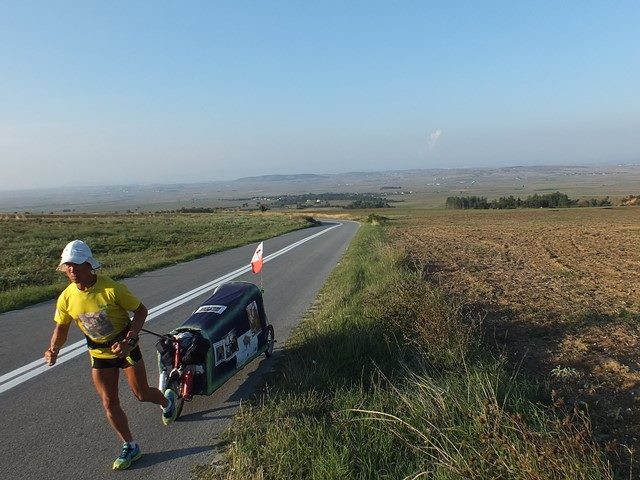
I believe that running is a mission for myself. I want to catch people's attention and to raise awareness of matters like piece and other ideals and charity.
Nobody is born perfect. You can fix and improve everything. When I started running I used to run around my home because I had no endurance and here I am now to run around the world. All the obstacles are in our mind.
Aykut Celikbas (the interview was given to Allesia De Matteis on behalf of Advendure. We want to thank Allesia for her significant help, as Aykut is the first runner from Turkey that runs Spartathlon)
[Alessia De Matteis]: When the decision of running Spartathlon was taken? I mean: everybody has in mind an idea or let’s say a dream but usually there is a specific moment in which the idea takes the shape of a reality.
[Aykut Celikbas]: It was the beginning of 2011. At that time I had completed three marathons and some other shorter races but I didn’t necessarily see myself as a runner. Because I was only training somewhat seriously 8-10 weeks before a marathon and then I was losing motivation or slacking off until the next one. So, around January 2011, I started reading about ultramarathons. You have to understand that there wasn’t a single ultrarunning race in Turkey up until September 2011 so it was really difficult to find motivation and I had a tough time wrapping my mind around the crazy distances people were running. So I read all the books and articles I could find about ultrarunning and educated myself about the culture and history of the sport. I found out that 100 mile races are mostly considered as the ultimate distance. Even though it looked quite impossible at that time, I started dreaming about running a 100 mile race. So I began to do longer training runs myself to see if that was possible.
It was that time when I first came across a race called Spartathlon. It sounded so ridiculously long, fast and tough that at first I thought this couldn’t have been an official race. It had to be some sort of “experimental run” done by a few crazy people. So I quickly dismissed it and focused on other races up to 100 miles. When I finished my first 100 mile race in Spain in October 2011, I was much more knowledgeable about the sport. And wherever I looked, I kept seeing that Spartathlon race which was regarded among the toughest by the most experienced ultrarunners. I finally accepted the fact that this was one of the most historical and respected ultras in the world and that I was ignoring this race because I was simply scared of it. So I started reading everything I could find about it… the history, the route, the organization, race reports etc. That’s when I truly understood the importance of this race and decided that I had to run it at some point but since the qualification criteria was so tough, I knew I had to wait at least a few years to get close to that level. So from that point on, it was always at the back of my mind as the ultimate challenge.
[Alessia De Matteis]: How did you prepare yourself, both physically and mentally, for one of the toughest races in world? Did you follow also a specific nutrition program?
[Aykut Celikbas]: I was accepted to run the race at the end of February. At that time I was barely able to run because of a hamstring injury. There was no question in my mind about participating, though. I knew I had to run this race when I had the chance but I also knew I had to be in top shape even just to have a chance to finish. I was back to building up in March and I ran a few races up to 80K (Iznik Ultra) in April to test my fitness. Starting May, I focused on doing some higher mileage (which is around 85-100 miles a week for me) for the next 4 months with a couple of light speed sessions every week. As with every long training program there were a few problems including a calf strain but I’d say things mostly went according to plan and I didn’t have big problems. For my mental preparation, I kept on reading everything I could find about the race. I visualized myself with different possible scenarios I might encounter during the race. As for nutrition… I always try to eat sensibly and try to avoid junk food as much as possible. I mostly did that during my training but at the same time I don’t have very strict rules. When you train that much it obviously creates a big stress on the body and there are of course other stresses coming from life, work and environment. I think it’s OK to reward yourself from time to time with some treats. Otherwise you can go quite crazy. At least that’s the case for me.
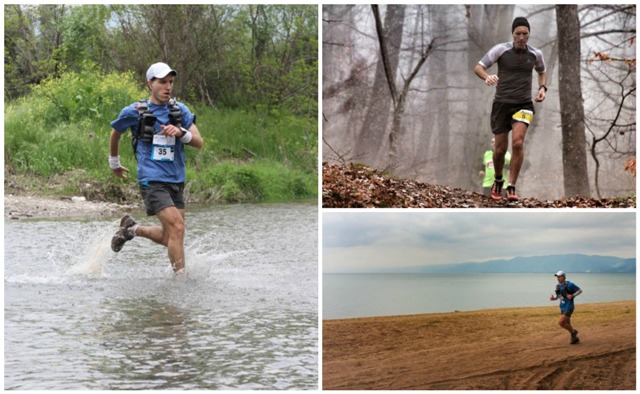
[Alessia De Matteis]: Do you feel a sort of “responsibility” in being the first Turkish athlete running Spartathlon? Do you think this will affect you performance or will help you in “bad times” during the race?
[Aykut Celikbas]: Yes and no. I can’t escape the fact that I’m the first Turkish runner in Spartathlon’s 32 year history. So at first sight, yes it does put some extra responsibility or pressure on my shoulders. But on the other hand, this was my dream race and I’ve put enough pressure on myself that I don’t think it would make a lot of difference until maybe the last few kilometers. I mean, if it was some race which I wasn’t already highly passionate about then it could have been different. But when it comes to Spartathlon, I don’t need a lot of external factors to motivate myself. I honestly believe that your interval motivation should be 110% to have a chance to touch King Leonidas’s foot. I think my bigger responsibility is to represent my country in a way that fits the ultrarunning culture and sportsmanlike conduct, and pay my deepest respects to the race’s history, organization, volunteers and to my fellow Spartathletes who come from all around the world.
[Alessia De Matteis]: Is there anything that really scares you in this competition?
[Aykut Celikbas]: I don’t want to use the word “scare” but of course there are things that “concern” me. Otherwise it wouldn’t be Spartathlon, For starters, like most people I’m concerned about the cut-offs, the distance on the pavement, the mountain and potential stomach issues etc. But I’m trying to use those concerns to motivate myself better and to search for effective ways to respond to them when they occur in the race. Even though I’ve researched as much as I could about the race, there are still a lot of unknowns. I’m looking forward to facing them in the race and finding solutions to overcome them. I think it’s the same for everybody no matter how fast or slow you are. There are about 370 runners this year and after the race I don’t think anyone would say, “Oh yes, everything went totally according to plan for the whole 246K!”. No, it won’t happen. If ultrarunning has thought me anything, it’s that you can’t expect anything to go according to plan. You have to make a plan but also be ready to discard it at any point in the race. It’s all about facing the unknown, problem solving on the go and quickly adapting to the situation as much as you can. The biggest challenge here in Spartathlon is that you have to do it much more quickly than other races because there’s simply not enough time.
[Alessia De Matteis]: If you should say 3 words/adjectives to express your feelings and emotions right know which one will you choose?
[Aykut Celikbas]: I’m excited to run this race. I’m curious to find out more about myself and thankful that I have this chance.
[Alessia De Matteis]: Who is your greatest running 'idol' - and why?
[Alessia De Matteis]: Sorry, I can’t say a specific person. There are just too many incredible achievements and inspiring stories in ultrarunning. I like to see fast people breaking records as much as anyone but to me what separates ultrarunning from most other sports is ordinary people doing extraordinary things. Those people inspire me as much as course records and world records and there are quite a few of them.
[Alessia De Matteis]: Why did you choose to run the Spartathlon - rather than some other really tough ultra marathon?
[Aykut Celikbas]: I think in most ways Spartathlon is the ultimate challenge. In most other ultras time limits are quite generous. Even though things don’t go according to plan, you can still finish if you take your time, gather yourself and just move forward. It mostly comes down to determination. To finish Spartathlon, you can’t be just fast; you have to have great endurance, too. You can’t be just “tough”; you also need to be moving quite quickly. You can be good on the roads but it may not be enough as there’s a legitimate mountain to climb at the 100 mile mark. You can be a good problem solver but can you do it fast enough to avoid the cut-offs? This race asks a lot of tough questions and I want to see if I have any answers to them. I know it will knock me down again and again. I want to see if I have the determination, courage and strength to get up and continue. It’s a chance to find out my strengths and weaknesses. It’s a race that would tell me who I’m really is.
[Alessia De Matteis]: Like any competitor, you must be imagining the moment you will touch the statue of Leonidas - what else do you expect to enjoy?
[Aykut Celikbas]: First of all, I need to say that I have the utmost respect for this race, the organization, the volunteers and runners. It’s truly an honor for me to run a race with so much history. Even though I know that there’ll be quite a bit of suffering involved, I know I’ll enjoy a lot of aspects of it. For starters, I’ll be running the historical route with some of the best and toughest ultrarunners in the world while being helped by some incredible volunteers who have been doing this for so 20-30 years. You can’t ask for much more than that. But I’ll also try to enjoy the suffering as much as I can. It’s not every day you face a challenge like this and I’m looking forward to finding out more about myself during the journey from Athens to Sparta.
Dimitris Troupis

Κατάγεται από το Ξυλόκαστρο Κορινθίας και ζει μόνιμα στην Πάτρα. Συμμετείχε στην συντακτική ομάδα του Adventure Zone από το 2009, ενώ μαζί με τον Τάκη Τσογκαράκη ίδρυσαν και "τρέχουν" το Advendure. Το τρέξιμο στα μονοπάτια των βουνών και η μεταφορά εικόνων και συναισθημάτων μέσα από τα άρθρα του αποτελεί αναπόσπαστο κομμάτι της ζωής του. Παθιάζεται με τους αγώνες ορεινού τρεξίματος, υπεραντοχής και περιπέτειας. Έχει πολλές συμμετοχές και διακρίσεις σε αγώνες ορεινού τρεξίματος όλων των αποστάσεων, με έμφαση στους αγώνες ultra trail. Θεωρεί ότι το τρέξιμο και η πεζοπορία στη φύση είναι μια εσωτερική ανάγκη του ανθρώπου, μας φέρνει πιο κοντά σε αυτήν και μας κάνει να αγαπήσουμε περισσότερο το περιβάλλον.
www.advendure.com